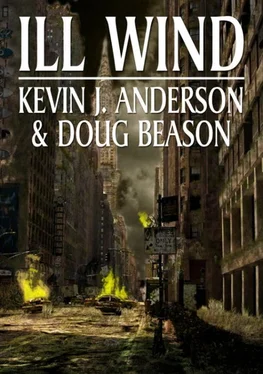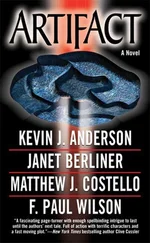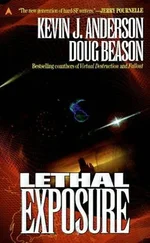A small Hispanic man with short salt-and-pepper hair and a narrow chin rode in the back of the supply wagon. Spencer didn’t recognize him. “A visitor?” he asked Rita.
Rita flipped her braids over her shoulder and pushed her lips together like a small wad of paper. “Not sure.”
Spencer kept his expression neutral as he walked to where the short stranger was getting off the wagon. The man held out a small, narrow hand to him. “Are you Spencer Lockwood?” he said in a way that showed he was accustomed to taking control. “I’m Gilbert Hertoya. Lance Nedermyer insisted that I come see you.”
Spencer shook the man’s hand, feeling a surprisingly rough and leathery grip, and suppressed a scowl, wishing he could just turn the wagon around and send the man back home. He carried himself with the air of an executive with nothing left to manage. “Yeah, Lance is always looking after our best interests—according to him. How can I help you?”
Hertoya smiled, apparently without malice. “Actually, I think I can help you .”
“Oh?” He waited for Hertoya to spring the bad news on him. “I need all the help I can get. I hope you came to lend a hand.”
“Well, I got tired of sitting on my butt in Alamogordo. I left my family there for now so I could get to work. You know we’ve got the potential here to—” Hertoya hesitated, then raised his dark eyebrows. “I guess I shouldn’t blame you for not recognizing me. I’m from the Sandia Lab in Albuquerque. I head up, or headed up, the electromagnetic launcher up on Oscura Peak.” He let that sink in.
“The satellite launcher? Now that’s interesting.” Spencer broke into a wide grin. If this guy knew how to run the EM launcher, he might be useful after all.
“Hey, Rita and Juan!” he called, “you guys finish unloading the wagon—we’ll need it for a trip to Oscura Peak.”
* * *
Spencer watched eagerly as Gilbert Hertoya opened the door to the stuffy bowels of the railgun controls. Sunlight pouring through the ceiling windows left pale patches of illumination in the control area. Dust motes settled through the air.
Spencer looked along the railgun corridor. Parallel steel beams extended to a vanishing point in the distance up the slope of Oscura Peak. He lost all sense of perspective. On either side, blue-painted boxes containing high-energy-density capacitors crowded the rails. Their footsteps echoed on the concrete floor.
“The EM launcher was a smaller project even than your antenna farm,” Hertoya said. “At least you started out with serious funding—we got zip from DOE, a little from NASA. To keep going we had to beg money from Sandia’s in-house research fund, mostly because we had our roots in the weapons community.”
“Well, we had to pinch a few pennies ourselves,” Spencer said, trying not to sound defensive. With the world irreparably changed around them, he noted with annoyance that he was still falling into old political patterns.
Rita squeezed next to him looking down the long rails. “Wow.” She coughed in the dusty air, but didn’t say another word.
Gilbert ushered them along the corridor. “You can only see the first two miles of the launcher. It extends another three miles up the foothills—for peak performance we need to install another mile and a half of railing. We can launch small payloads to low-Earth orbit with what we have; we need the additional mile and a half to get us up to the higher, useful orbits.
“My team has been steadily putting this together for the past six years. Before the petroplague, that is. We used mostly grad student labor from New Mexico State—cheap and enthusiastic.” He shook his head sadly. “We’ve got piles of railing and capacitors stored near the top of the peak, more than enough to finish putting it together. If we were funded like other Sandia projects, we could have become a real launch facility years ago.”
Hertoya stepped under the twin rails and pointed to the first bank of capacitors. Spencer ran a hand along the rail. The steel felt cold and slick. The wheels in his mind spun furiously, trying to figure how they could get the launcher up and running.
“We place the payload on these rails in a conducting shell called a sabot. We charge the capacitors and fire them off, one after another in a sophisticated timing operation. Each one adds to the total magnetic field that pushes the sabot up the launcher, nudge after nudge after nudge. By the time the payload reaches the end of the rails, it’s traveling over ten klicks a second—more than enough to reach low-Earth orbit.”
Spencer nodded with continued interest. “The payload weighs what, a couple hundred kilograms, if I remember right?”
“The entire package can weigh a thousand kilograms. Three hundred of that is pure payload. Most of the rest is the guidance system and a small rocket to insert the payload into orbit.”
Spencer looked at the blue capacitor boxes, then suddenly felt a sinking at the pit of his stomach. Well, that’s that, he thought. The entire setup was as worthless as a Detroit auto factory now. They had been so close.
“I shouldn’t have gotten my hopes up.” Spencer started to turn away. “Capacitors have oil dielectrics. They’re useless.”
“Oil?” Gilbert made a dismissive gesture. “No, we decided against an oil dielectric in favor of some new insulating technology. These just use distilled water.”
Spencer froze. “Water-based capacitors?”
Rita laughed. “Where you been, Spence, on Mars?”
“If we could use this launcher to get the rest of our satellite constellation in orbit, we’d have practically a continuous ring of smallsats. It would be easy to add other antenna farms on the ground.”
“Spencer, we have to figure out how to survive the winter!” Rita interrupted. “Aren’t you getting a little ahead of yourself? It needs another one and a half miles of railing. It’s taken them six years to get this far.” Rita smiled apologetically at Gilbert. “Spencer gets this way sometimes.”
“There are plenty of people back in Alamogordo who’d break their backs to get this thing working, because it’s one of the only chances we have for the future,” Spencer insisted, “even if it does take several years.”
As he spoke, he grew more passionate. “They’ve got nothing to do, and they want to help get the world back on its feet. You saw the response we got from the ranchers.”
“That was for horses and food, Spence, not for… for working on the railroad!” Rita said, exasperated.
Spencer slung an arm over Hertoya’s shoulder. “Rita can handle the supply details if you oversee finishing the railgun project. The microwave farm doesn’t need any more people for the conversion process—”
He grew more animated with every step. “We could have limitless energy from the satellites. White Sands can be a new Atlantis, the only place left with the comforts of 20th century life!”
As they stepped into the sunshine, Rita shook her head. “Sometimes I think his brain is just going to explode.”
The Sandia mountains east of Albuquerque turned a deep pinkish red as light from the setting sun struck them. Desert sunsets were stark and pure, filled with a silent rawness that always reminded him of his days in Gulf combat.
And that reminded him of the thirty thousand lives under his charge at Kirtland Air Force Base. Thirty thousand souls , he thought. All in his hands, at this time of crisis.
The first directive from newly sworn president Jeffrey Mayeaux had come down like a hammer on an anvil. All military commanders were to bring cities under strict martial law. They were to enforce curfews, stockpile supplies for orderly distribution among the populace, and enforce a rule of order at all costs. Via shortwave radio the president had ordered local commanders to call up nearby contingents of the National Guard.
Читать дальше












